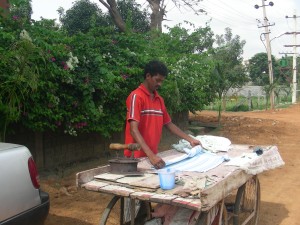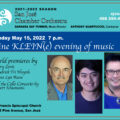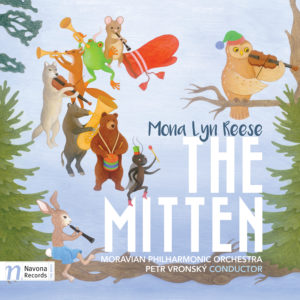I’m excited to have the book author of the new opera Tom and I are writing, as a guest blogger. Farahad Zama wrote the novel, The Marriage Bureau for Rich People. I’ve had many conversations with him; what a charming person he is! In this first blog, he has written a two-part story where I get to meet three of his characters: Mr and Mrs Ali, owners of the Marriage Bureau, and their assistant, Aruna.
My fictional self was nervous to meet the illustrious Marriage Bureau colleagues, especially since my nickname “Mona Darling” invokes famous Indian movie characters. Imagine my nickname was “Make my day” or “Hi-Ho Silver” or “Bond. James Bond” or “Here’s lookin’ at you, kid”. Well! That’s part of the fun.
Farahad tells us how I meet the Ali’s and Aruna, part 1. Part 2 is coming next week.
 What is an opera?’ asked Mrs Ali. She was sitting on the wicker chair in the verandah of their house while her husband and Aruna, his assistant sat on two chairs behind the table. A parrot sat on a perch in one corner, its head tucked into its wings. The verandah of the house was also the offices of The Marriage Bureau For Rich People. It was three in the afternoon and the sun was beating down strongly on the little front yard of the house. There was little traffic on the road that ran past the house and there were few pedestrians.
What is an opera?’ asked Mrs Ali. She was sitting on the wicker chair in the verandah of their house while her husband and Aruna, his assistant sat on two chairs behind the table. A parrot sat on a perch in one corner, its head tucked into its wings. The verandah of the house was also the offices of The Marriage Bureau For Rich People. It was three in the afternoon and the sun was beating down strongly on the little front yard of the house. There was little traffic on the road that ran past the house and there were few pedestrians.

The Dhobi Wallah (washes and irons clothes)
The washerman who ironed the clothes on a cart on the other side of the road had drawn an old saree as a canopy over his cart and was sleeping. The leaves of the guava tree in the Alis’ front yard drooped listlessly as if even the tree was drowsy.
‘Opera is…’ said Aruna.
‘Half an operation,’ interrupted Mr Ali quickly.
‘Ration,’ said the parrot, taking its head out of its wings and staring at Mrs Ali. The parrot was a new addition to the household, something that Mrs Ali was not happy about. It’s smirking at me, she thought.
‘Shut up, you painted crow,’ said Mrs Ali. ‘Stop repeating everything like a… a…’
‘Like a parrot?’ asked Mr Ali. Mrs Ali glared at her husband. It was his fault that the bird had come into the house. He had gone to the market a few weeks ago to buy fish and coriander and had returned with a sickly-looking parrot instead. To Mrs Ali’s annoyance, he had even forgotten the coriander. ‘It was stuck in a small cage and couldn’t even move. Its wings have been clipped and it’s foot is injured. See…’ She hadn’t wanted to see the bird’s bloody foot and had scowled. ‘I couldn’t leave it to die, could I?’ he had asked.
‘How much did you pay for it?’
‘Er… not much…’ he answered, looking so uncomfortable that she knew he had overpaid for a parrot that was on it’s last leg – literally.
She had sighed and turned away. What could she say? Her husband was just that kind of man, and besides, it looked as if it would die any moment, so she wouldn’t have to put up with it for long. ‘Make sure it doesn’t make the whole house dirty.’ To her surprise, the parrot had not only survived, it thrived. It’s foot healed, the coat became glossy and the dull rheumy look in its eyes was replaced by sharp penetrating glances. Because its wings were clipped, Mr Ali let it run loose during the day and only put it in its cage in the night. Over the days, Mrs Ali had grown to, first, tolerate, and then enjoy, the parrot’s presence – though, of course, she would never admit that to her husband. It fluttered from the curtain rod to the top of the wall clock to the wardrobe and watched Mrs Ali went about cooking or cleaning or praying, occasionally repeating the last word it heard in a pretty good mimicry.
‘If you don’t know what an opera is, just say so. Don’t crack stupid jokes,’ Mrs Ali said.
‘Of course I know what an opera is,’ said Mr Ali. ‘It’s fat people singing in Italian.’
‘Fat People?’ said Mrs Ali, skeptically.
‘Fat!’ said the parrot, before going back to worrying the walnut that Mr Ali had procured for it earlier in the day.
‘Yes, fat people,’ said Mr Ali. ‘I’ve seen it on television.’
‘Why do they sing in Italian?’ asked Mrs Ali.
‘May be because Italian is a beautiful language,’ said Aruna, stopping her typing. ‘I’ve heard that Telugu is called the Italian of the East.’
‘Hmmm…’ said Mrs Ali. ‘May be they should call Italian the Telugu of the West.’
Aruna said, ‘As my teacher used to say, Desa bhaashalandu Telugu bhaasha lessa.’ Amongst all the country’s tongues, Telugu language is the best.
‘Oh, which teacher was that?’ said Mr Ali.
‘My Telugu teacher,’ said Aruna.
A car rolled to a stop at the gate and a woman stepped out. Mrs Ali looked out and told the others, ‘She’s here.’
They all stood up. ‘Hello everybody,’ said the lady in an American accent, ‘I am Mona.’
‘Mona,’ said the parrot, dropping the half-eaten walnut.
Aruna giggled. She had grown up in a poor family that was also very orthodox and for both those reasons, cinema was a rare treat and restricted to mythological tales from the Mahabharata and Ramayana. After her marriage, she had moved into a different world. She and her husband lived with his parents in their huge house and she had access to two – two! – televisions; a massive television in the living room and a smaller one that hung like a picture on the wall in her bedroom. She also found a library of DVDs heavily weighted to Bollywood movies from the seventies and eighties. These movies were epic in scope, combining action, comedy, romance, song and pathos. They were also quite formulaic and many of them featured a villain called Ajit.
One glance was enough to tell the audience that he was a villain – he was rich, he wore tweed jackets and sunglasses even when indoors, he spoke with a foreign accent and because those were the old innocent days, he was usually a gold smuggler. Today, he would be a drug smuggler or a terrorist. In every movie he also had a voluptuous girlfriend, invariably called Mona. One of his dialogues that had stuck in her head was, ‘Mona darling, press the switch and drop him in liquid oxygen. The liquid won’t let him live and the oxygen won’t let him die.’
Mr Ali glared at Aruna and she quickly turned aside and turned her giggle into a cough. ‘Sorry,’ she murmured.
Mona looked at the bird. ‘Oh, a parrot, how lovely! I sent a message earlier. Did you get it?’
‘Yes, yes, Madam Mona,’ said Mr Ali, coming forward.
The introductions over, they all sat down. Tea and snacks had been offered, refused and then accepted and Aruna realized that despite her skirts, her pale skin that had turned red in the heat and her strange boyish hair, Mona was a very well-mannered lady, and not all that different from many others that she knew. And she had a lovely, friendly smile.
‘So Madam Mona, do you realize just how much trouble you have caused us with your proposal?’ Mrs Ali said.








[…] If you didn’t see the first part of me meeting fictional characters, it’s right here: http://monalynreese.wpengine.com/i-meet-fictional-characters-guest-blog/ […]